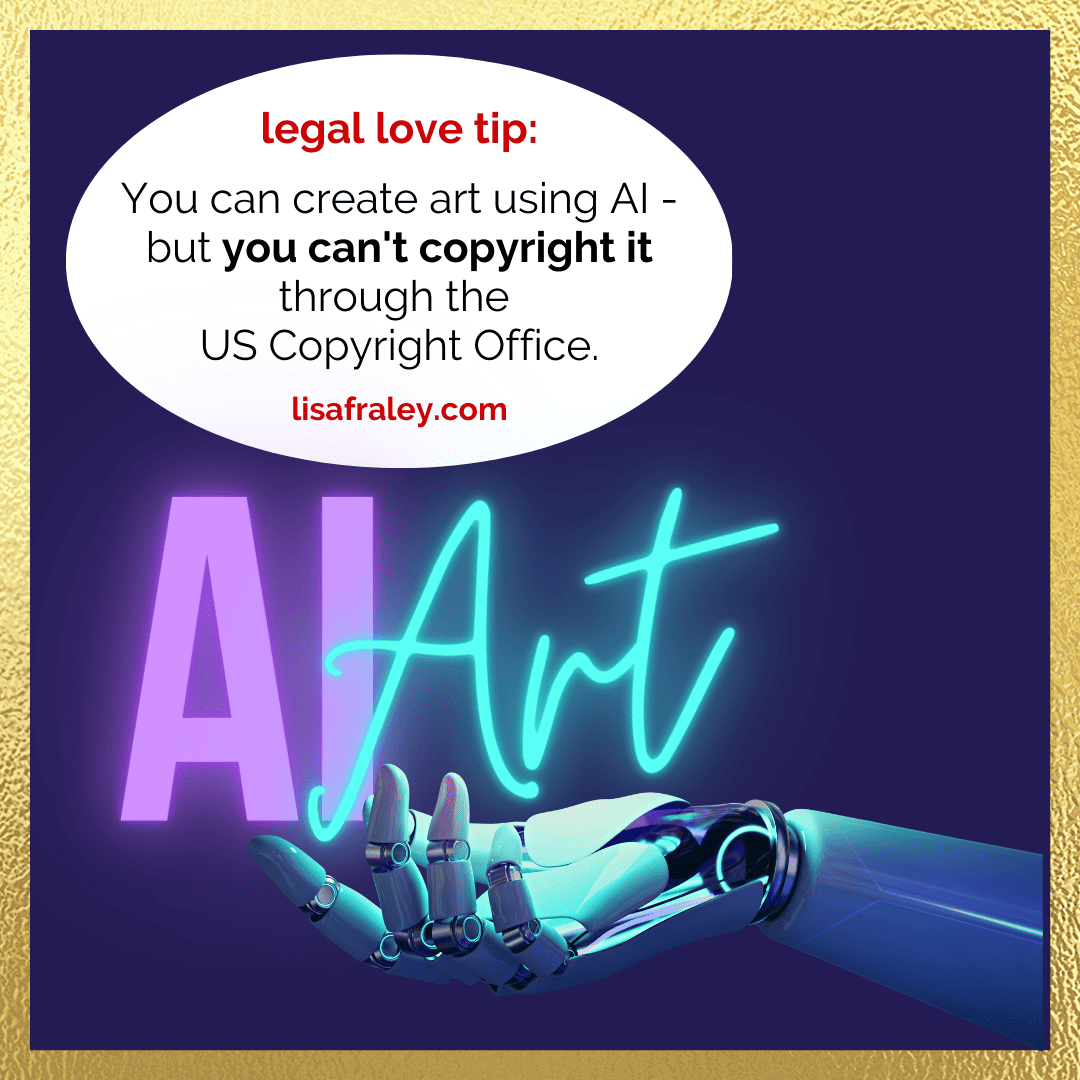If You Use AI, DON’T do this…
AI is everywhere, it seems.
Everyone keeps talking about what you can create, write, edit, summarize, draw and develop using AI to save you time, energy and money.
But what hasn’t been talked about much is what you CAN’T do with AI.
You already may have heard that you CAN’T use AI to:
– Summarize complex topics
– Pick up nuances in language
– Incorporate “common sense” into things
– Do homework or write essays in some colleges and New York City public schools
– Perform financial transactions if you work for J.P. Morgan Chase (they banned use of ChatGPT)
And now there’s ANOTHER thing you can’t do using AI…. are you ready?
Legal Love™ Tip: You can create art using AI – but you can’t copyright it through the U.S. Copyright Office.
Not too long ago, there was a situation where a comic book author created a comic book and filed for copyright rights with the U.S. Copyright Office. The copyright was granted. All good.
But, not so fast…
Recently, the U.S. Copyright Office REVERSED its ruling.
It said that images created for a comic book using an image generator owned by an AI company (Midjourney) actually should NOT have been copyrighted in the first place.
The U.S. Copyright Office said that when the author submitted the original copyright filing for the comic book that “incomplete information” was provided.
The author did not disclose that the images were generated by AI.
The U.S. Copyright Office ruled that ALL other parts of the comic book (including the text and the “arrangement” of images and text) can still be copyrighted – but not the images.
Why did the U.S. Copyright Office reverse the copyright of AI-generated images?
Because the copyright law requires that any copyrighted work be “original” by the “author”.
The U.S. Copyright Office stated in its Compendium (Third) § 313.2 titled “Works That Lack Human Authorship” that “[T]he Copyright Act protects ‘original works of authorship.’ 17 U.S.C. § 102(a). To qualify as a work of ‘authorship’ a work must be created by a human being.” (emphasis added)
They also say that “the [Copyright] Office will not register works produced by a machine or mere mechanical process that operates randomly or automatically without any creative input or intervention from a human author.”
The comic book author responded (in summary, not verbatim), “Wait a minute! I guided the creation of the image through AI. I had a hand in it!”
But that wasn’t enough.
The U.S. Copyright Office ruled that the “AI-assisted” images were not originally created by the comic book author. The AI Company was the “owner” of the images – not the comic book author.
And since only the rightful “owner” can copyright images, the copyright was reversed.
So, how did the U.S. Copyright Office find out that the images were AI-generated anyway?
From the comic book author’s social media posts. Yep. That’s how. Can you believe that?
(Psst! Be careful what you put on social media!)
Here are 3 Legal Tips if You Use AI:
1. Don’t try to copyright an AI-generated image in a comic book (or printed book, digital product, or anything else) with the U.S. Copyright Office.
2. Only copyright text and images that YOU create.
3. Or, if someone else (like a graphic designer) creates images for YOU to include in your work, be sure they’ve legally transferred their ownership in the images, and all of their copyright rights to you BEFORE you try to file with the U.S. Copyright Office.
I hope this info helps you navigate this new AI space on the legal front. It’s a whole new world for all of us, for sure!



